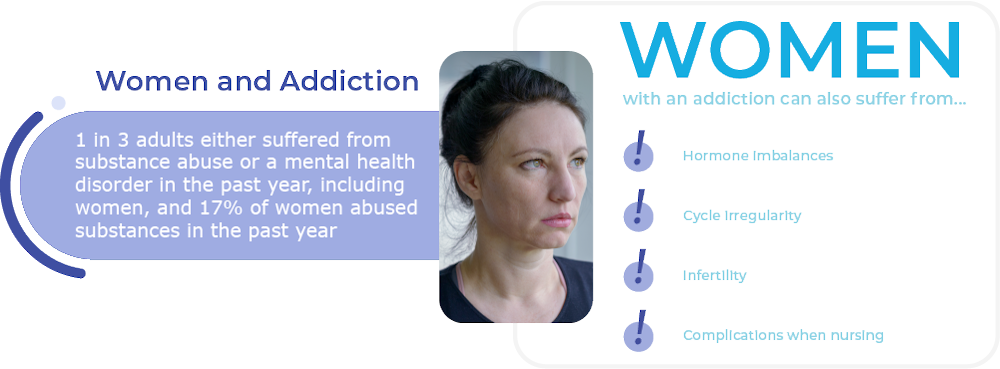Women’s Addiction Treatment
in Washington State
Despite suffering the negative consequences that result from drug and alcohol use and abuse, many women and men put off seeking treatment. They’re often rooted in denial, believing that they can quit anytime. They tell themselves and others that they don’t need a drug rehab program because they do not have a problem. However, nothing could be further from the truth.
While women and men experience addiction differently, the goal of Bayview Recovery is to lead our clients to recovery. We understand that you may have previous rehab experiences that were unsuccessful or unpleasant, but do not let that stop you from getting help for yourself or a loved one.
At Bayview Recovery, we believe that everyone in our Washington State Treatment Programs deserves the best possible care. We provide a series of evidence-based and holistic treatment options, which we tailor to the needs of the client, giving them the best possible chance for long-term recovery. Our Women’s Addiction Treatment Program is also tailored to provide gender-specific treatment that addresses women’s unique needs. Don’t put off seeking treatment for another day. Contact Bayview Recovery to learn about our women’s drug rehab program today.

How Do Women Differ from Men in Addiction?
Although addiction does not discriminate between genders, men and women can have different experiences and outcomes when it comes to addiction. Here are some ways in which women may differ from men in addiction:
Studies have shown that women tend to progress more quickly from initial substance use to addiction than men. This could be due, in part, to biological and hormonal differences between genders. For example, women may have higher levels of certain hormones that affect drug metabolism, making them more susceptible to the effects of drugs. Additionally, women may have smaller body sizes, which can lead to higher concentrations of drugs in the body.
There may also be social and cultural factors at play. Women may face unique stressors, such as gender-based violence or discrimination, that can lead to substance use as a coping mechanism. Women may also feel more pressure to conform to societal norms and expectations, which can result in increased substance use. Our treatment programs in Washington work to dismantle any gender-based discrimination.
Women may be more susceptible to relapse during recovery from addiction for several reasons. Firstly, women may struggle to find support and resources specifically tailored to their needs. This can make it more difficult to maintain sobriety and avoid triggers.
Secondly, women may be more likely to experience intense emotional and psychological stressors, such as relationship issues, childcare responsibilities, or financial hardship, which can trigger the desire to use substances as a coping mechanism.
Thirdly, social stigma and gender norms may make it more difficult for women to seek help and find support for their addiction, leading to isolation and a higher risk of relapse.
Finally, biological factors such as hormonal changes during pregnancy or menopause can also increase a woman’s risk of relapse. It is important for women in recovery to have a strong support system and access to resources and treatment that takes into account their unique needs and circumstances.
Women may face more barriers to addiction treatment than men due to a variety of reasons. One of the biggest barriers is related to childcare responsibilities. Women are often primary caregivers for children, and it can be difficult to find childcare options when attending treatment programs.
Furthermore, women may face more societal stigma and discrimination related to addiction, which can make it harder for them to access treatment. Women who use drugs or alcohol may be more likely to be judged or criticized by family, friends, and healthcare providers, which can lead to feelings of shame and embarrassment.
In addition, women who seek treatment for addiction may face discrimination related to other factors such as race, ethnicity or sexual orientation, further exacerbating the barriers to treatment.
As a result, it is important to ensure that addiction treatment programs are designed to address these unique needs of women, by providing childcare or family support services, and by promoting an environment of inclusivity and understanding.
Women may be more likely to use substances as a means of self-medication for mental health issues such as anxiety, depression, trauma, or PTSD. This is because women experience mental health issues more frequently than men due to biological, psychological, and social differences.
For example, women are more likely to experience hormonal fluctuations during the menstrual cycle, pregnancy, postpartum period, and menopause, which can increase vulnerability to depression and anxiety. At our center for anxiety therapy in Tacoma, we have female medical professionals that understand the specific unique qualities of women, which helps drastically during the treatment process.
Furthermore, women may face unique stressors related to social roles and expectations such as sexism, discrimination, or gender-based violence, leading to increased rates of anxiety and depression.
When seeking relief from these mental health issues, women may turn to substances as a way to cope. However, this pattern of self-medication can lead to addiction and exacerbate mental health issues, creating a dangerous cycle.
Women may be more likely to experience certain health consequences as a result of addiction due to biological differences compared to men. For example, due to smaller body masses and less water content in their bodies, women can have higher concentrations of drugs and alcohol in their bloodstream.
Furthermore, women’s bodies have less of an enzyme called dehydrogenase, which breaks down alcohol in the stomach, leading to increased liver damage from alcohol abuse.
In addition, women who use drugs may be at higher risk for reproductive issues such as irregular menstruation, spontaneous abortions, or premature menopause.
Finally, women who inject drugs or share needles are at a higher risk of contracting blood-borne viruses such as HIV/AIDS or hepatitis.
These differences highlight the need for gender-specific approaches to addiction prevention and treatment, as well as the importance of addressing gender-specific factors that may contribute to addiction in women.
Why Should You Seek Treatment for a Substance Use Disorder?
There are numerous reasons, but overall you ultimately want to live your best life, free of the pain and suffering that addiction brings. Some of the more common reasons for seeking treatment include the following:
Substance abuse can lead to a number of severe health problems, including liver and kidney disease, heart problems, cancer, lung disease, and more.
If you’re struggling with a substance use disorder, your relationships have likely suffered as a result. Drug and alcohol abuse can strain even the strongest relationships—friends, family, and co-workers. In treatment, you’ll learn how to repair the damage that’s been done and build healthy, supportive relationships.
If you’re using drugs or alcohol at work, it’s only a matter of time before you get caught and lose your job. In treatment, you’ll have the opportunity to work on your job skills so that you can reenter the workforce with confidence.
If you’ve been arrested for DUI or any other drug-related offense, getting help is essential before things spiral out of control. In treatment, you’ll learn how to make better choices and avoid the legal problems resulting from drug and alcohol abuse.
If you’ve been in recovery before, you know relapse is always possible. While relapse is always a potentiality, those who have undergone professional treatment are more likely to remain in recovery. Going it alone or “cold turkey” is very rarely effective for any meaningful long-term recovery. In treatment, you’ll learn how to identify the triggers that can lead to relapse and how to avoid them.

Why Should I Seek a Women’s Addiction Treatment Program?
As a leader in addiction treatment, we have worked with many women suffering from substance use disorders, and we understand the unique challenges women face in seeking and maintaining recovery. In our experience, women thrive in women-specific treatment programs, as these programs are tailored to meet the specific needs of women and provide a safe and supportive environment for healing.
A women’s specific program addresses issues that are unique to women in addiction, such as trauma, self-esteem, reproductive health, childcare responsibilities, and relationships. These programs provide comprehensive and holistic approaches to treatment, addressing the physical, emotional, and spiritual needs of women.
In a women’s specific program, women can find a sense of community and solidarity, which greatly enhances the recovery process. Women can connect with other women who share similar experiences, and gain support and empowerment from fellow participants.
Additionally, these programs offer access to women-specific amenities and services, such as gynecological care, childcare support, parenting classes, and domestic violence resources.
Research has shown that women who participate in women-specific treatment programs are more likely to complete treatment and maintain long-term recovery compared to those in mixed-gender programs.
If you are a woman struggling with addiction, I encourage you to seek out a women’s drug rehab program. Through compassionate and tailored care, you can find the tools and support you need to overcome addiction and achieve lasting sobriety.

Our Women’s Addiction Treatment in Tacoma, Washington Can Help
People turn to drugs and alcohol for several reasons, and getting at the heart of those reasons is key to finding sobriety. Every person has a unique addiction story, but there are many shared reasons for addiction, too. These commonly include the following:
- Mental health disorders: Depression, anxiety, bipolar disorder, or PTSD from trauma are just some of the mental health conditions that can contribute to substance use disorder as many women self-medicate to mitigate mental health symptoms.
- Unresolved trauma: Trauma can happen in childhood or as an adult and include sexual assault, domestic violence, and near-fatal experiences like car crashes, mass shootings, tornadoes, and warfare.
- Codependent relationships: A codependent relationship is one in which someone else’s well-being is dependent on the addict’s drug use. This often happens in relationships with an emotionally abusive partner.
- Loneliness: A feeling of profound loneliness or isolation can lead to addiction as people self-medicate to fill the emptiness they’re feeling inside.
- Low self-esteem: Women with low self-esteem are more likely to turn to drugs and alcohol to cope with negative feelings about themselves.
A lack of healthy coping skills: When people don’t have healthy coping skills, they’re more likely to turn to drugs and alcohol to deal with stress, anxiety, and other difficult emotions. These are just some of the reasons women turn to drugs and alcohol. In treatment, you’ll work with a therapist to uncover the root cause of your addiction so that you can begin to heal the underlying wounds.

Reach Out to Bayview Recovery
 If you’re ready to get help for your addiction, we’re here for you. Bayview Recovery is a Joint Commission-accredited drug and alcohol rehab center in Tacoma, Washington. We offer a variety of evidence-based treatment options, including individual and group therapy, 12-step programming, and more.
If you’re ready to get help for your addiction, we’re here for you. Bayview Recovery is a Joint Commission-accredited drug and alcohol rehab center in Tacoma, Washington. We offer a variety of evidence-based treatment options, including individual and group therapy, 12-step programming, and more.
We understand how difficult it is to ask for help, but we also know it’s worth it. If you’re ready to take the first step on your journey to recovery, contact us online. We’re here to help you every step of the way.
Dave Cundiff, MD, MPH is an experienced leader in the field of Substance Use Disorder treatment. He works with patients suffering from Substance Use Disorder to evaluate their medication needs and prescribe treatments accordingly. In addition, he regularly participates in all-staff debriefing sessions involving peers, nurses, and other prescribers. He also reviews and advises on policies, procedures, and techniques for treating substance use disorder.




